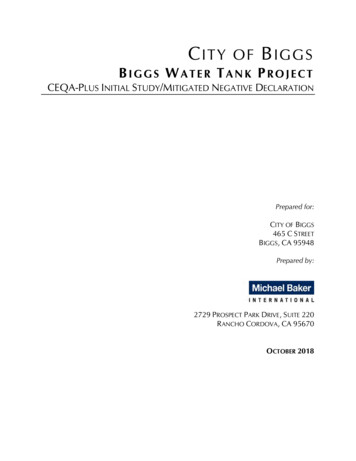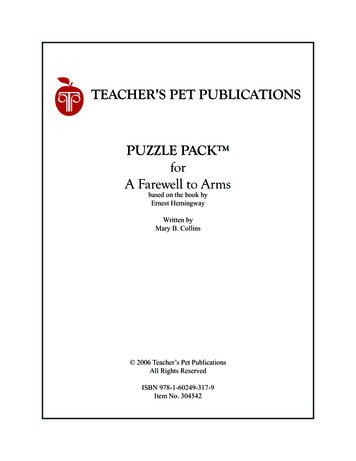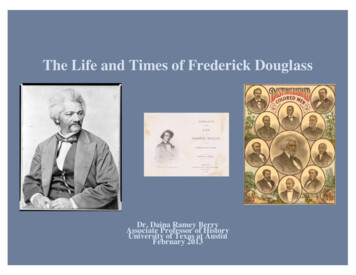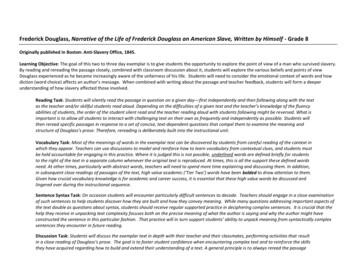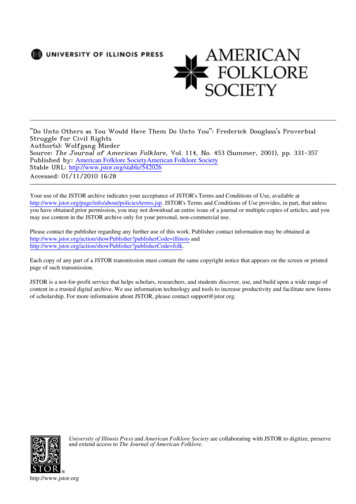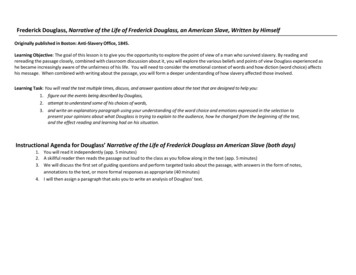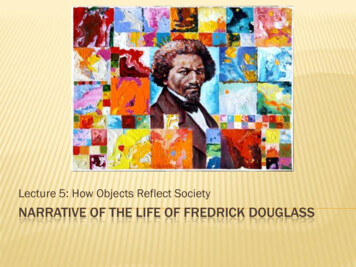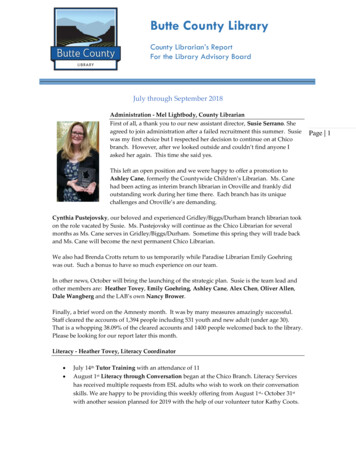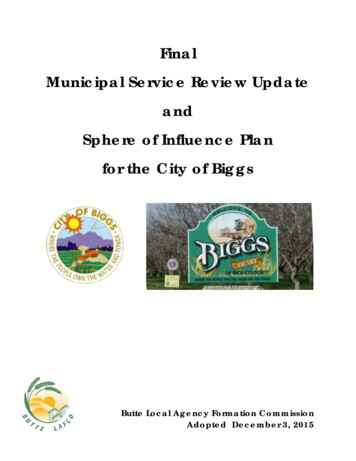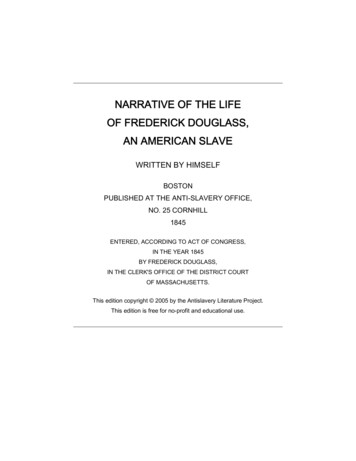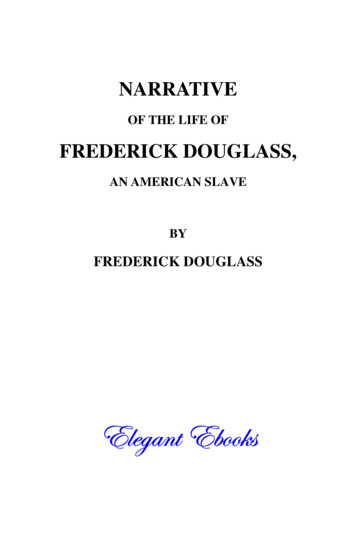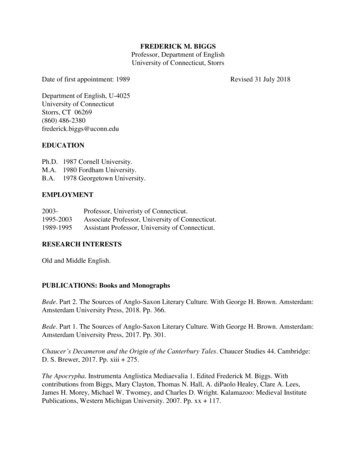
Transcription
FREDERICK M. BIGGSProfessor, Department of EnglishUniversity of Connecticut, StorrsDate of first appointment: 1989Revised 31 July 2018Department of English, U-4025University of ConnecticutStorrs, CT 06269(860) 486-2380frederick.biggs@uconn.eduEDUCATIONPh.D. 1987 Cornell University.M.A. 1980 Fordham University.B.A. 1978 Georgetown or, Univeristy of Connecticut.Associate Professor, University of Connecticut.Assistant Professor, University of Connecticut.RESEARCH INTERESTSOld and Middle English.PUBLICATIONS: Books and MonographsBede. Part 2. The Sources of Anglo-Saxon Literary Culture. With George H. Brown. Amsterdam:Amsterdam University Press, 2018. Pp. 366.Bede. Part 1. The Sources of Anglo-Saxon Literary Culture. With George H. Brown. Amsterdam:Amsterdam University Press, 2017. Pp. 301.Chaucer’s Decameron and the Origin of the Canterbury Tales. Chaucer Studies 44. Cambridge:D. S. Brewer, 2017. Pp. xiii 275.The Apocrypha. Instrumenta Anglistica Mediaevalia 1. Edited Frederick M. Biggs. Withcontributions from Biggs, Mary Clayton, Thomas N. Hall, A. diPaolo Healey, Clare A. Lees,James H. Morey, Michael W. Twomey, and Charles D. Wright. Kalamazoo: Medieval InstitutePublications, Western Michigan University. 2007. Pp. xx 117.
Source of Wisdom: Old English and Early Medieval Latin Studies in Honour of Thomas D. Hill.Edited Charles D. Wright, Frederick M. Biggs, and Thomas N. Hall. Toronto: University ofToronto Press. 2007. Pp. xxiii 420.Sources of Anglo-Saxon Literary Culture. Volume 1: Abbo of Fleury, Abbo of Saint-Germaindes-Prés, and Acta Sanctorum. Edited Frederick M. Biggs, Thomas D. Hill, Paul E. Szarmach,and E. Gordon Whatley. Kalamazoo: Medieval Institute Publications, Western MichiganUniversity, 2001. Pp. xlvi 548.The Sources of Anglo-Saxon Literary Culture: A Trial Version. Edited Frederick M. Biggs,Thomas D. Hill, and Paul E. Szarmach. Binghamton: MRTS, 1990. Pp. xxxxi 256.The Sources of Christ III: A Revision of Cook’s Notes. Old English Newsletter Subsidia 12.Binghamton, 1986. Pp. 48.Old English Newsletter. Vol. 27.1-3 (1993-94). Guest Editor.OnlineSources of Anglo-Saxon Literary Culture: https://saslc.wikispaces.com/Lecture at King’s College London, 31 October 2017:https://www.youtube.com/watch?v OpFlVdVcPkULecture at Oxford University, 21 February 2018:https://www.youtube.com/watch?v 8QB7SznSl6oLecture at the New Chaucer Society, 11 July 2018https://www.youtube.com/watch?v IpF3AUFFIlEArticles“Chaucer’s Gnof,” forthcoming in Studies in the Age of Chaucer 40 (2018).“Two Scribal Additions Concerning Capitula in Bede’s List of his Works,” Revue bénédictine128 (2018), 84-94.“Bede’s Martyrologium and the Martyrologium Hieronymianum,” Analecta Bollandiana 134(2016), 241-78.“Domino in domino dominorum: Bede and John of Beverley,” Anglo-Saxon England 44 (2015),17-30.
“The Miller’s Tale and Decameron 3.4,” JEGP 108 (2009), 59-80.“Ælfric’s Mark, Other Things, and Apostolic Authority,” Studies in Philology 104 (2007), 22749.“’Righteous People according to the Old Law’: Ælfric on Anna and Joachim,” Apocrypha 17(2006), 173-99.“The Politics of Succession in Beowulf and Anglo-Saxon England,” Speculum 80 (2005), 709-41.“The Miller’s Tale and Heile van Beersele,” Review of English Studies ns 56 (2005), 497-523.“Ælfric’s Andrew and the Apocrypha,” JEGP 104 (2005), 473-94.“Hondscioh and Æschere in Beowulf,” Neophilologus 87 (2003), 635-52.“Beowulf and some Fictions of the Geatish Succession,” Anglo-Saxon England 32 (2003), 55-77.“Beowulf’s Fight with the Nine Nicors,” Review of English Studies ns 53 (2002), 311-28.“The Naming of Beowulf and Ecgtheow’s Feud,” Philological Quarterly 80 (2001), 95-112.“Bede’s Use of Augustine: Echoes from Some Sermons,” Revue bénédictine 108 (1998), 201-13.“Deor’s Threatened ‘Blame Poem,’” Studies in Philology 94 (1997), 297-320.“Traditions Concerning Jamnes and Mambres in Anglo-Saxon England,” with Thomas N. Hall,Anglo-Saxon England 25 (1996), 69-89.“Theophany in the ‘Miller’s Tale,’” with Laura Howes, Medium Ævum 65 (1996), 269-79.“Part III of the Moralia in Bodley 310: A New College Manuscript,” Bodleian Library Record15.1 (1994), 13-19.“’For God is after an hand’: Piers Plowman B XVII.138-205,” Yearbook of Langland Studies 5(1991), 17-30.“Unities in the Old English Guthlac B,” JEGP 89 (1990), 155-65.“The Fourfold Division of Souls: Christ III and the Insular Homiletic Tradition,” Traditio 45(1989-90), 69-85.“The Eschatological Conclusion of the Old English Physiologus,” Medium Ævum 58 (1989),286-97.
“The Passion of Andreas: Andreas 1398-1491,” Studies in Philology 85 (1988), 413-27.“”Englum gelice’: Elene line 1320 and Genesis A line 185,” Neuphilologische Mitteilungen 86(1985), 447-52.“’Aungeles Peeris’: Piers Plowman, B 16.67-72 and C 18.85-100,” Anglia 102 (1984), 426-36.Chapters in Books“Christ III and ‘Apparebit repentina dies magna Domini,’” forthcoming in Old EnglishTradition: Essays in Honor of J.R. Hall, ed. Lindy Brady (Tempe: MRTS, 2019).“History and Fiction in the Frisian Raid,” in The Dating of Beowulf: A Reassessment, ed.Leonard Neidorf, (Cambridge: D. S. Brewer, 2014), 138-56.“Edgar’s Path to the Throne,” in Edgar, King of the English 959-975, ed. Donald Scragg(Woodbridge, Suffolk: Boydell & Brewer, 2008), 124-39.“A Picture of Paul in a Parker Manuscript,” in (Inter)Texts: Studies in Early Insular CulturePresented to Paul E. Szarmach, ed. Virginia Blanton and Helene Scheck (Tempe: MRTS, 2008),171-91.“Folio 179 of the Beowulf-Manuscript,” in Source of Wisdom: Old English and Early MedievalLatin Studies in Honour of Thomas D. Hill, ed. Charles D. Wright, Frederick M. Biggs, andThomas N. Hall (Toronto: University of Toronto Press, 2007), 52-59.“The Dream of the Rood and Guthlac B as a Literary Context for the Monsters in Beowulf,” inText, Image, Interpretation: Studies in Anglo-Saxon Literature and its Insular Context in Honourof Éamonn Ó Carragáin, ed. Alastair Minnis and Jane Roberts (Turnhout: Brepols, 2007), 289301.“An Introduction and Overview of Recent Work,” in Apocryphal Texts and Traditions in AngloSaxon England, Publications of the Manchester Centre for Anglo-Saxon Studies 2, ed. KathrynPowell and Donald Scragg (Cambridge: D. S. Brewer, 2003), 1-25.“Comments on the Codicology of Two Paris Manuscripts (BN lat. 5574 and 13,408),” in ViaCrucis: Essays on Sources and Ideas in Memory of J.E. Cross, ed. Thomas N. Hall, withassistance from Thomas D. Hill, and Charles D. Wright (Morgantown: West Virginia UniversityPress, 2002), 358-62.“The Exeter Exeter Book?: Some Linguistic Evidence,” in The Dictionary of Old English:Retrospects and Prospects, Old English Newsletter Subsidia 26, ed. M. J. Toswell (Kalamazoo:The Medieval Institute, Western Michigan University and its Rawlinson Center for Anglo-SaxonStudies, 1998), 63-71.
“Ælfric as Historian: His Use of Alcuin’s Laudationes and Sulpicius’ Dialogues in his two Livesof Martin,” in Holy Men and Holy Women: Old English Prose Saints’ Lives and Their Contexts,ed. Paul E. Szarmach (Albany: State University of New York Press, 1996), 289-315.Notes“‘Ausculto praecepta magistri’ in Bede’s De orthographia,” Revue bénédictine 127 (2017), 21719.“Three Epigrams by Bede,” Notes and Queries n.s. 62 (2015), 493-97.“A Bared Bottom and a Basket: A New Analogue and a New Source for the Miller’s Tale,” Notesand Queries n.s. 56 (2009), 340-41.“Seventeen Words of Middle Dutch Origin in the Miller’s Tale?” Notes and Queries ns 53(2006), 407-09.“A Further Quotation of Columbanus in Alchfrid’s Letter to Hyglac,” Notes and Queries ns 53(2006), 12-14.“Ælfric’s Comments about the Passio Thomae,” Notes and Queries ns 52 (2005), 5-8.“Vercelli Homily 6 and the Apocryphal Gospel of Pseudo-Matthew,” Notes and Queries ns 49(2002), 176-78.“Unidentified Citations of Augustine in Anglo-Latin Writers,” Notes and Queries ns 44 (1997),154-60.“Alcuin’s Use of Augustine and Jerome: A Source and a Recollection Identified,” Notes andQueries ns 41 (1994), 3-6.“Biblical Glosses in Ælfric’s Translation of Genesis,” Notes and Queries ns 38 (1991), 286-92.“Spiritual Blindness in the Old English Maxims I, Part I,” with Sandra McEntire, Notes andQueries ns 35 (1988), 11.“The End of the Sea: The Old English Exodus, lines 466b-467a,” Notes and Queries ns 32(1985), 290-91.“The Age of Iarad: Genesis A (lines 1184 and 1192),” Notes and Queries ns 30 (1983), 290-91.
Dictionary Entries“Old English Religious Poetry,” Oxford Bibliographies Online ?rskey ebGyvh&result 1&q biggs#firstMatch“Bible in Old English Literature,” in Medieval England: An Encyclopedia, ed. Paul E. Szarmach,M. Teresa Tavormina, and Joel T. Rosenthal (New York: Garland, 1998), 128-29.ReviewsBede and the Future, ed. Peter Darby and Faith Wallis (Farnham, Surry, 2014), in JEGP 117(2018), 95-98.Honour, Exchange and Violence in Beowulf, Peter S. Baker (Cambridge, Eng., 2013), in RES ns65 (2014), 539-41.Comedy in Chaucer and Boccaccio, Carol Falvo Heffernan (Cambridge, Eng., 2009), in JEGP110 (2011), 409-11.Finding the Right Words: Isidore’s Synonyma in Anglo-Saxon England, Claudia Di Sciacca(Toronto, 2008), in JEGP 109 (2010), 530-31.Water and Fire: The Myth of the Flood in Anglo-Saxon England, Daniel Anlezark (Manchester,Eng., 2006), in Speculum 83 (2008), 655-56.Old English Enigmatic Poems and the Play of the Texts, John D. Niles (Turnhout, 2006), inSpeculum 83 (2008), 225-27.Mary’s Mother: Saint Anne in Late Medieval Europe, Virginia Nixon (University Park, Penn.,2004), in Mystics Quarterly 32 (2006), 72-74.The Old English Poem “Judgement Day II”: A Critical Edition of “De die iudicii” and Hatton113 Homily “Be domes dæge,” ed. Graham D. Caie, Anglo-Saxon Texts 2 (Cambridge, 2000), inModern Language Review 98 (2003) 153-54.Beowulf and the Dragon, Christine Rauer (Cambridge, 2000), in Medium Ævum 70 (2001), 31920.Apocalypse of Paul: A New Critical Edition of Three Long Latin Versions, Theodore Silversteinand Anthony Hilhorst (Geneva, 1997), in The Journal of Medieval Latin 10 (2000), 433-35.Gold-Hall & Earth-Dragon: Beowulf as Metaphor, Alvin A. Lee (Toronto, 1998), in MediumÆvum 69 (2000), 297-98.
The Old English Lives of St Margaret, Mary Clayton and Hugh Magennis (Cambridge, 1993), inJEGP 95 (1996), 223-25.English Caroline Script and Monastic History: Studies in Benedictinism, A.D. 950-1030, D.N.Dumville (London, 1993), in Medium Ævum 64 (1995), 119.Havelok, ed. G.V. Smithers (Oxford, 1987), in JEGP 88 (1989), 87-89.The Old English Finding of the True Cross, ed. and trans. Mary-Catherine Bodden (Cambridge,1987), in Envoi 1 (1988), 202-07.PAPERS READ“The Economies of the Marriage Group,” MLA Convention, Chicago, January 2019.“Boccaccio’s Place in the Marriage Group,” New Chaucer Society, Toronto, July 2018.“References: In Honor of Charles D. Wright,” Fifty-Third International Congress of MedievalStudies, Western Michigan University, Kalamazoo, Michigan, May 2018.“Chaucer’s Decameron and the ‘Wife of Bath’s Tale’: Why do Literary History?” OxfordUniversity, February 2018.“The Evidence of Literary History: The ‘Lover’s Gift Regained’ and the ‘Gnof,’” King’s CollegeLondon, October 2017.“The Chaucer-Gower Quarrel,” Fifty-Second International Congress of Medieval Studies,Western Michigan University, Kalamazoo, Michigan, May 2017.“Bede, Acca of Hexham, and the Old English Martyrology,” Celebrating the Saints: A Focus onMartyrologies and Calendars, Trinity College, Dublin, October 2016.“Domino in domino dominorum: Bede and John of Beverley,” Fifty-First International Congressof Medieval Studies, Western Michigan University, Kalamazoo, Michigan, May 2016.“Ælfric’s Knowledge of Bede’s Commentaries on Mark and Luke: The Problem of Excerpts,”Leeds International Medieval Congress, Leeds, UK, July 2015.“Money in Decameron 8.1, 8.2, and 8.10 and in the Shipman’s Tale,” Fiftieth InternationalCongress of Medieval Studies, Western Michigan University, Kalamazoo, Michigan, May 2015.“Chaucer’s Unfinished Canterbury Romances: A Tale of (Literary) Empire Building,” Leeds
International Medieval Congress, Leeds, UK, July 2014.“Testing the Rule of the Single Narrative Source: The Nun’s Priest’s Tale,” Forty-ninthInternational Congress of Medieval Studies, Western Michigan University, Kalamazoo,Michigan, May 2014.“The Confessio amantis and Other Sources for the Canon’s Yeoman’s Tale,” Canada ChaucerSeminar, University of Toronto, April 2014.“Fanti e Famigliari nel Decameron and some Followers in the Canterbury Tales,” Boccaccio:Rome 2013, Sapienza, Università di Roma, June 2013.“The Decameron as Source for Chaucer’s Use of Sources,” Boccaccio at 700: Medieval Contextsand Global Intertexts, Center for Medieval and Renaissance Studies, Binghamton University,April, 2013.“Folklore, Florent, and the Wife of Bath’s Tale,” Medieval Academy of America, Knoxville,April, 2013."History and Succession in the Transition to Geatish-Swedish Wars," Doctoral Conference,Harvard University, October, 2012.“Three Novelle from the Decameron and the Shipman’s Place in the Literary Fragment,” NewChaucer Society Meeting, Portland, July 2012.“Iberian Sources for Gower’s ‘Tale of Three Questions,” Forty-seventh International Congress ofMedieval Studies, Western Michigan University, Kalamazoo, Michigan, May 2012.“Licisca’a Outburst, or What the Tales of the Miller and Shipman say about the Origin of theCanterbury Tales,” “Chaucer, Boccaccio, and the Italian Trecento,” Pembroke College,Cambridge, January 2012.“Anglo-Saxon Succession and the Date of Beowulf,” “The Dating of Beowulf: A Reassessment,”Harvard University, September 2011.“The Shipman’s Tale’s Trade in Three Novelle from the Decameron,” Forty-sixth InternationalCongress of Medieval Studies, Western Michigan University, Kalamazoo, Michigan, May 2011.“The Shipman’s Tale: Sources,” invited lecture, Cornell University, 10 March 2011.“Christ III and ‘Apparebit repentina dies magna Domini,’” Forty-fourth International Congress ofMedieval Studies, Western Michigan University, Kalamazoo, Michigan, May 2009.“The Demise of Joint Kingship in Anglo-Saxon England,” International Society of AngloSaxonists, London, June 2007.
“Gnof and the Source of the Miller’s Tale,” Forty-Second International Congress of MedievalStudies, Western Michigan University, Kalamazoo, Michigan, May 2007.“Anna and Joachim at the End of the Tenth Century,” Forty-First International Congress ofMedieval Studies, Western Michigan University, Kalamazoo, Michigan, May 2006.“Ælfric and the Apostles in the Frontispiece of Cambridge, Corpus Christi College MS 198,”Harvard Medieval Doctoral Colloquium, March 2006.“Self-judgment in Beowulf: the Anglo-Saxon and Scandinavian Evidence,” Fortieth InternationalCongress of Medieval Studies, Western Michigan University, Kalamazoo, Michigan, May 2005.“Eadwig and Edgar in 955: the Case for Joint-Kingship,” Manchester Centre for Anglo-SaxonStudies, conference on "Edgar the Peaceable, king of the English 959 (957)-975," March 2005.“Ælfric’s Saint Mark, Evangelist and Other Things,” Thirty-Ninth International Congress ofMedieval Studies, Western Michigan University, Kalamazoo, Michigan, May 2004.“Beowulf and the Politics of Succession in Anglo-Saxon England,” War, Peace, and Tolerationin the Ancient and Medieval World, University of Connecticut, 2 April 2004.“Ælfric’s Andrew: Apostle or Saint?” Thirty-Eighth International Congress of Medieval Studies,Western Michigan University, Kalamazoo, Michigan, May 2003.“Beowulf: The Monsters and the Theme,” University of Leicester, January 2003.“Fitt 31 in Beowulf,” Department of Anglo-Saxon, Norse and Celtic, Cambridge University,November 2002.“Translating the Past: History as Metaphor in Beowulf,” Thirty-Seventh International Congress ofMedieval Studies, Western Michigan University, Kalamazoo, Michigan, May 2002.“The Naming of Beowulf and Ecgtheow’s Feud,” Seminar on the History of the Book, OxfordUniversity, October 2001.“The Apocrypha in SASLC: A Decade after the Trial Version,” Apocrypha in Anglo-SaxonEngland, University of Manchester, July 2001.“Beowulf Becomes the King: Fitt 31, Frisian Raid, and CD-Rom,” Thirty-Sixth InternationalCongress of Medieval Studies, Western Michigan University, Kalamazoo, Michigan, May 2001.“Hygelac, Hrethel, and Ongentheow: History as Metaphor in the Final Third of Beowulf,” King’sCollege, London, January 2001.
“Anglo-Saxon Portics,” Manchester Centre for Anglo-Saxon Studies, November 1999.“The Sermons of St. Augustine in SASLC and Fontes,” Fifteenth Open Meeting of FontesAnglo-Saxonici, King’s College, London, March 1999.“Anglo-Saxon Portics: Using the Literary Evidence,” Society of Antiquaries of London,November 1998.“Portics in Bede and Ælfric,” Thirty-Third International Congress of Medieval Studies, WesternMichigan University, Kalamazoo, Michigan, May 1998.“Heile and the Miller,” Thirty-Second International Congress of Medieval Studies, WesternMichigan University, Kalamazoo, Michigan, May 1997.“The Exeter Exeter Book?: An Evaluation of Some Linguistic Evidence,” Medieval Academy ofAmerica, Toronto, April 1997.“Theophany in the Miller's Tale,” Cornell University, April 1995.“Where the Wild Things Are: Beowulf's Fight with the Nine Nicors,” Twenty-Ninth InternationalCongress of Medieval Studies, Western Michigan University, Kalamazoo, Michigan, May 1994.“Deor's Threatened ‘Blame Poem,’” 109th Convention of the Modern Language Association,December 1993.“Augustine,” Twenty-Eighth International Congress of Medieval Studies, Western MichiganUniversity, Kalamazoo, Michigan, May 1993.“Hagiography as History: the Reception of Saints’ Lives in Late ASE,” New York University,February 1992.“Apocrypha,” Twenty-sixth International Congress of Medieval Studies, Western MichiganUniversity, Kalamazoo, Michigan, May 1991.“The Limits of SASLC,” Twenty-fourth International Congress of Medieval Studies, WesternMichigan University, Kalamazoo, May 1989.“The Eschatological Conclusion of the Old English Physiologus,” 104th Convention of theModern Language Association, December 1988.“Further Evidence for Identifying Cracow MS Bibl. Capit. 140 (olim 43) as an InsularHomiliary,” Twenty-third International Congress of Medieval Studies, Western MichiganUniversity, Kalamazoo, May 1988.“The Passion of Andreas,” Twenty-second International Congress of Medieval Studies, Western
Michigan University, Kalamazoo, May 1987.“Unities in the Old English Guthlac B,” University of Iowa, February 1987.“Insular Eschatology in the Old English Christ III,” Twenty-first International Congress onMedieval Studies, Western Michigan University, Kalamazoo, May 1986.“Dúan in Choícat Ceist,” Tionól, at the Dublin Institute for Advanced Studies, School of CelticStudies, April 1984.“The Middle English Pearl and Fourteenth-century Epistemology,” Patristic, Mediaeval, andRenaissance Conference, Villanova University, October 1980.“Kingship in Beowulf,” Conference on Medieval and Renaissance Studies, Cleveland StateUniversity, 1980.HONORSCo-Director, Sources of Anglo-Saxon Literary Culture, May 2013-.Editorial Board, Speculum, 2011-2014.Administrative committee of the Sources of Anglo-Saxon Literary Culture, 1987- .Executive committee of the Fontes Anglo-Saxonici, a collaborative British project to establish aregister of written sources used by authors in Anglo-Saxon England, 1987-97; advisorycommittee, 1997-2007.Research Associate at the Center for Medieval and Early Renaissance Studies, SUNYBinghamton, 1987- .Scholar at the Dublin Institute for Advanced Studies, 1983-84.GRANTS AND FELLOWSHIPSUniversity of Connecticut Reseach Foundation Large Grant, Fall 2011.Chancellor's Research Fellowship, University of Connecticut, Spring 2003.National Endowment of the Humanities, Summer Research, 1995.American Council of Learned Societies, Fellowship for Recent Recipients of the Ph.D., forSpring term of 1990.American Philosophical Society, Fellowship for Summer Research, 1989.National Endowment for the Humanities, Research Division, named participant in the "Sourcesof Anglo-Saxon Literary Culture," directed by Paul E. Szarmach, 1987-89; renewal,1990-92.Rotary International Foundation Fellowship, 1983-84.
SERVICE (selected)Reader of articles for JEGP, Lit, Mediaevalia, Medium Æum, Old English Newsletter, PMLA,Religion and Literature, RES, Speculum, and Traditio.Reader of books and monographs for Medieval and Renaissance Texts and Studies, the OldEnglish Newsletter Subsidia, and the University of Toronto Press.Reader of grants for the National Endowment for the Humanities, Division of ResearchPrograms, and the University of Connecticut Research Foundation.External examiner of doctoral theses at the University of Toronto.Member of the Van Courtlandt Elliott Prize, Medieval Academy.Director of the University of Connecticut’s London Program.
"The Passion of Andreas: Andreas 1398-1491," Studies in Philology 85 (1988), 413-27. ""Englum gelice': Elene line 1320 and Genesis A line 185," Neuphilologische Mitteilungen 86 (1985), 447-52. "'Aungeles Peeris': Piers Plowman, B 16.67-72 and C 18.85-100," Anglia 102 (1984), 426-36. Chapters in Books "Christ III and 'Apparebit repentina dies magna Domini .
